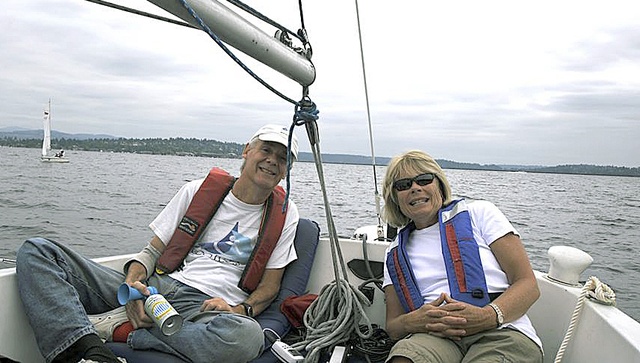What began as an idea between a small group of three is now a thriving nonprofit celebrating its silver anniversary.
This year, the Footloose Sailing Association is celebrating 25 years of providing sailing opportunities to people of all disabilities, as well as their friends, families and caregivers.
Footloose founder and president Bob Ewing said he only recently realized the organization was turning 25. Ewing and co-founders Ron Singleton and Fred Hayes originally got together to start a club after Singleton put out an ad in a wheelchair sports flyer.
“Only three of us showed up,” Ewing recalled. “We said this is enough to start a club, so we did.”
Footloose arranges 10 events every summer, with nine day sails on Lake Washington from Leschi North Moorage in Seattle. Sailors go out on the water for two hours, break for lunch, then go back out for another two hours, though Ewing points out participants may go out for as long or short as they like. The 10th trip is an overnight camping trip to Blake Island. The 10 events take place once every two weeks from May to September.
The nonprofit’s boat fleet includes four access dinghies for two with side-by-side sailing, two 16-foot Martin sailboats equipped for joystick or sip-and-puff control for sailors with limited mobility, two 21-foot Columbia sailboats with swivel seats for sailors with limited mobility and balance and a Boston Whaler chase boat for safety purposes.
Volunteers use a cranelike davit system with a hoyer sling to transfer sailors from a wheelchair to the boat and back. After that, a varying degree of control goes to the sailors.
“When you think about a person who can’t dress themselves or feed themselves and can now sail a boat on their own, that’s pretty powerful,” Ewing said.
Ewing is a longtime Islander and 1969 graduate of Mercer Island High School. In 1973, he broke his neck diving off a bridge on the Yakima River, an accident that left him in a wheelchair.
Ewing refers to himself as a “low quadriplegic” and says he has somewhat use of his hands, though is more limited with his left.
“I can steer the boat and pull on the jib sheet as long as the wind isn’t blowing too strong,” he said.
Ewing noted people can be affected by disabilities in two different ways: those who are born with a disability and don’t know their life to be any different, and those who become disabled at some point in their life. His hope is to provide a sense of freedom to all who participate.
“It changes your life and kind of shatters things,” he said. “Our motto is ‘leave your disability at the dock.’ A woman will show up who’s had a stroke and she’s feeling pretty destroyed. After they get out on the water and say, ‘Hey, I can do this,’ you see them grow and become more confident.”
“It’s rehab but it’s not done under the direct flag of rehabilitation. It just happens,” he said. “It’s doing things with your friends, it’s getting out of the house. It’s more than going sailing; it’s kind of putting lives back together again. For those who are disabled their whole lives, it’s finding another thing they can do that is fun.”
Ewing said Footloose has a regular team of about 20 volunteers who help out with events. The organization is always looking for volunteers, and knowing how to sail is not among the requirements.
He said there are three areas for volunteer opportunities: helping on shore with activities such as registration, setup and preparing sailors for their trips, assisting people on to boats as well as preparing and securing boats from the dock, and working as a skipper or crew member on the water.
Ewing said Footloose operates on $18,000 a year, largely from corporate sponsors and private donations, which goes toward paying its moorage to the city of Seattle, insurance costs and maintaining boats. He hopes one day Footloose will have a home of its own.
“If we had a place on the water with parking and a dock where we could keep boats, that would be wonderful,” he said. “I’d like to have a paid staff, which would make it a much bigger budget. But in the event someone picks up the phone and says, ‘I’d like to go sailing,’ we could say, ‘Fine, come to the dock and we’ll have it ready for you.’ That’s the ultimate goal.”
For more on the Footloose Sailing Association, visit www.footloosedisabledsailing.org.


